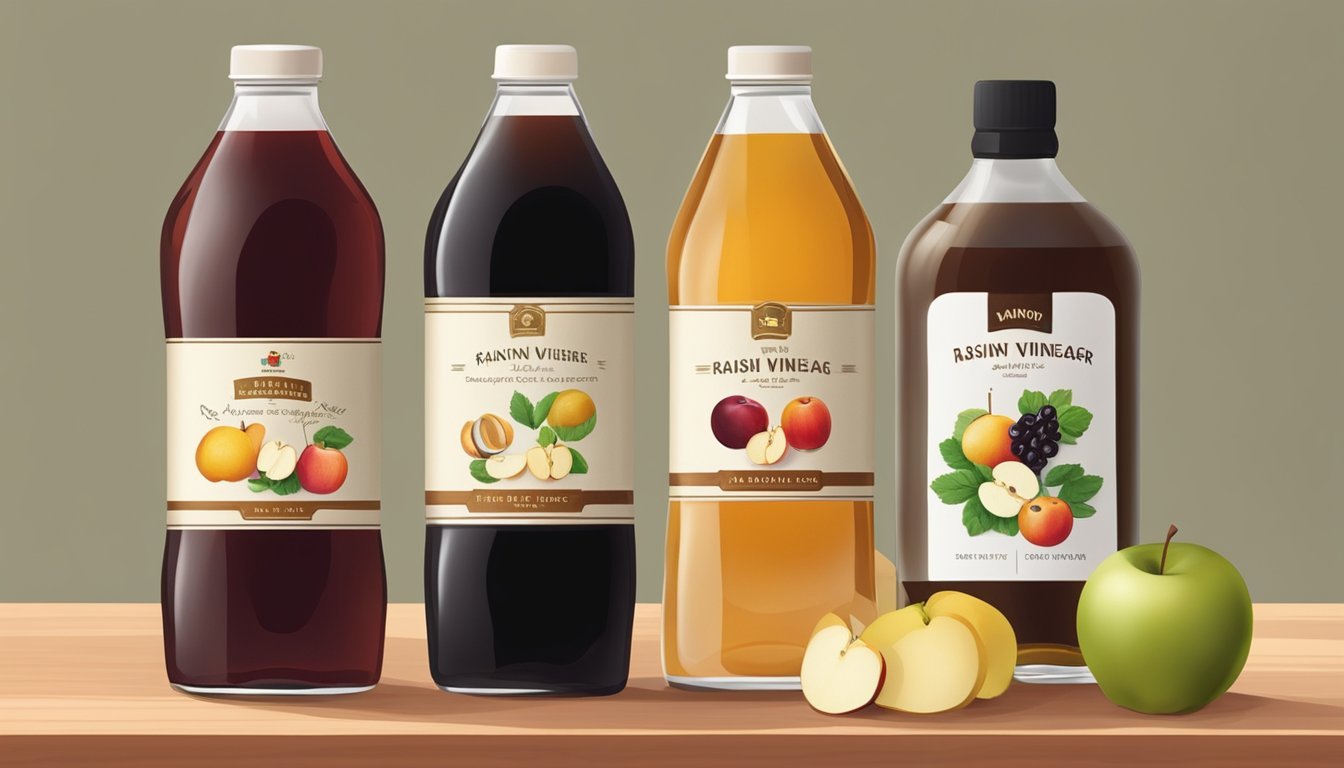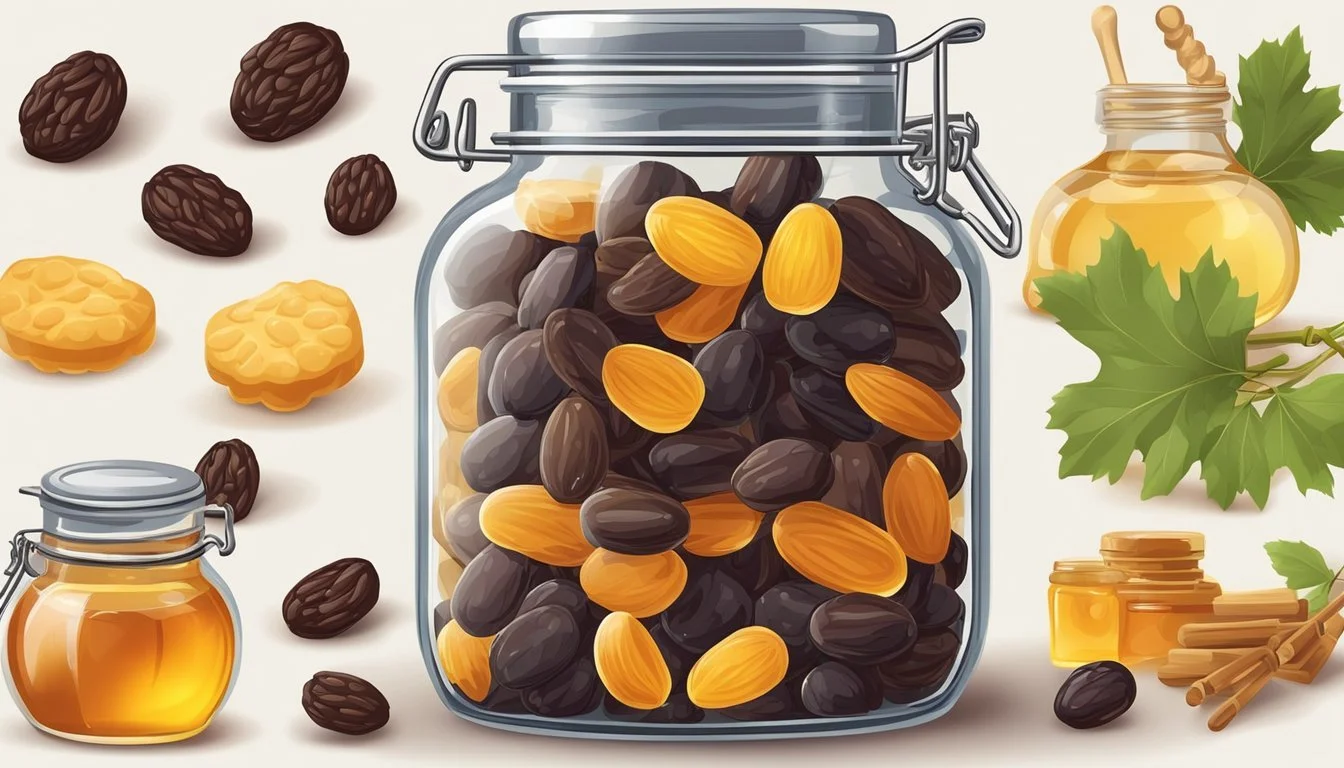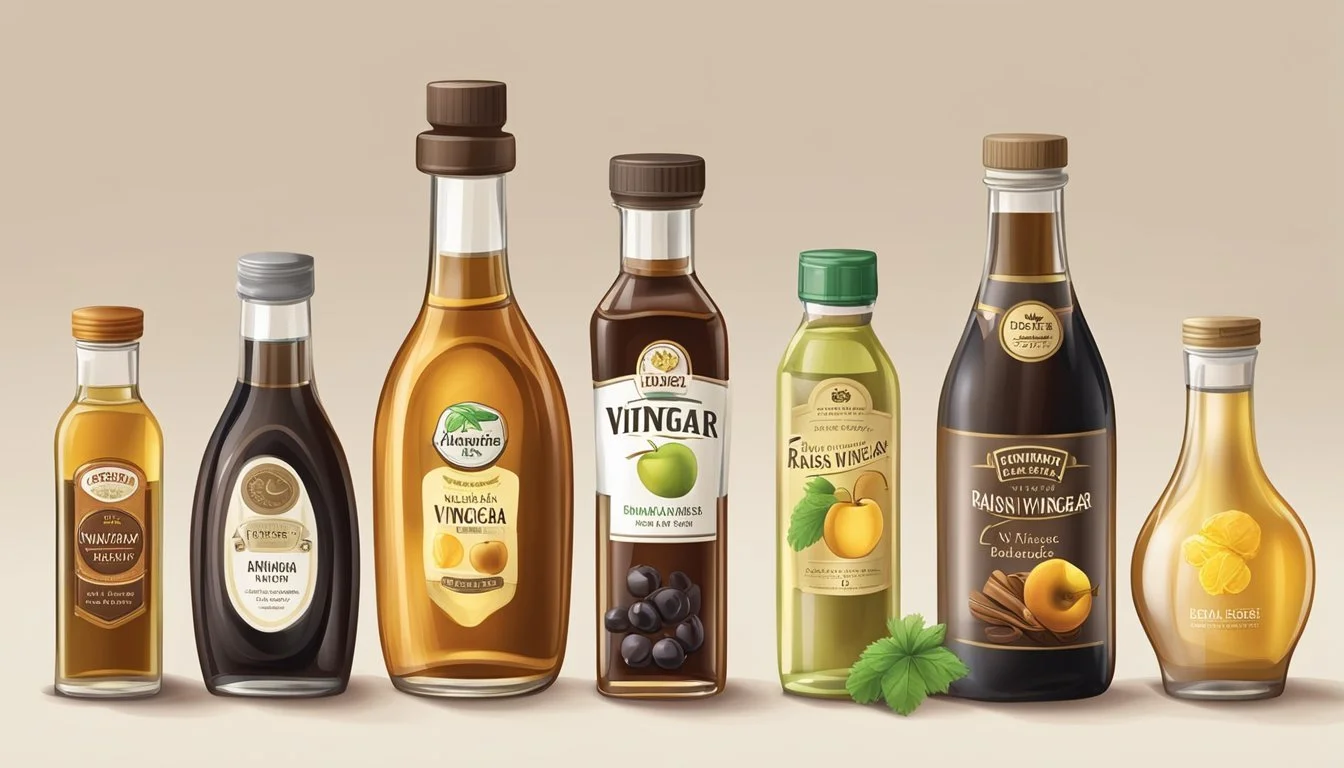Raisin Vinegar Substitutes
Top Alternatives for Your Recipes
Raisin vinegar, with its rich and slightly sweet profile, is a staple in many culinary applications, adding depth and complexity to sauces, dressings, and marinades. When it's unavailable, finding an appropriate substitute can help maintain the intended flavor balance of a dish without compromising on taste. The key to selecting an effective alternative is understanding the unique characteristics of raisin vinegar—its mild acidity coupled with the hint of sweetness—and finding a counterpart that offers a similar flavor profile.
In the landscape of vinegars and other acidic agents, there are several options that can mimic the essence of raisin vinegar. Substitutes such as balsamic vinegar mixed with sugar, or apple cider vinegar, are recommended for their comparable sweetness and acidity. The chosen substitute should blend seamlessly with the other ingredients, ensuring that the flavor profile of the original recipe is preserved as much as possible. Each alternative brings its own nuances to a dish, and understanding these subtle differences is crucial for any culinary adaptation.
Understanding Raisin Vinegar
Raisin vinegar, often praised for its rich flavor and nutritional content, finds its place in various culinary traditions. Here, we explore its origins, unique taste profile, and the health advantages it offers.
Origin and Culinary Uses
Raisin vinegar is produced through the fermentation of raisins, which are dried grapes. This process imparts distinct characteristics to the vinegar, setting it apart from other types in culinary applications. Culinary uses of raisin vinegar include its role as a dressing in salads, a flavor enhancer in marinades and sauces, and a key ingredient in certain ethnic dishes, particularly in Middle Eastern cuisine.
Flavor Characteristics
The flavor of raisin vinegar is notably complex. It combines a fruity sweetness due to the nature of the dried grapes with a subtle tartness characteristic of vinegar. This balance of sweet and sour allows it to complement robust and hearty dishes, as well as add depth to lighter fare.
Nutritional Benefits
Raisin vinegar offers a range of nutritional benefits. It contains:
Vitamins: B-vitamins for energy metabolism.
Minerals: Such as iron and potassium, important for maintaining various bodily functions.
Antioxidants: Helps to combat oxidative stress in the body.
While its contribution to daily nutrient intake may be modest due to the small serving sizes typically used, the presence of these nutrients does enhance the overall nutritional profile of meals that include raisin vinegar.
Common Substitutes for Raisin Vinegar
When a recipe calls for raisin vinegar and it's not available, a variety of other vinegars and acidic liquids can serve as suitable substitutes. The key is to match the sweetness and acidity level as closely as possible to that of raisin vinegar.
Fruit Vinegars
Fruit vinegars are the closest substitutes for raisin vinegar due to their similar fruity undertones and sweetness. Apple cider vinegar stands out as an excellent choice, providing a mild taste with a subtle apple flavor. Raspberry vinegar offers a zestier profile, ideal for dressings and marinades, while champagne vinegar brings a delicate and light taste, perfect for subtle flavor enhancements.
Wine Vinegars
The more robust wine vinegars, including red wine vinegar and white wine vinegar, are less sweet but carry a potent acidity that can mimic that of raisin vinegar. Red wine vinegar works well in hearty dishes, while white wine vinegar suits lighter preparations. Sherry vinegar with its nutty notes can be an alternative, delivering complexity to dishes.
Citrus Juices
Citrus juices also make an effective stand-in for raisin vinegar on account of their natural acidity and inherent sweetness. Lemon juice and lime juice can be swapped in equal amounts for a fresh, tangy zest in any dish, providing a bright lift to flavors.
Balsamic Vinegar
Although it is slightly more syrupy and bold, balsamic vinegar can be used as a substitute for raisin vinegar. It imparts a deep, rich flavor and adds a layer of sweetness that is similar to the natural sugars found in raisin vinegar. Balsamic vinegar works exceptionally well in reductions and glazes.
Substituting Raisin Vinegar in Recipes
When a recipe calls for raisin vinegar and it’s not available, there are other vinegars and ingredients that can serve as substitutes, providing a similar balance of sweetness and acidity.
Salad Dressings and Marinades
For salad dressings and marinades where raisin vinegar imparts a sweet and fruity flavor, apple cider vinegar can be used as a substitute due to its mild taste with a hint of fruitiness. Adding a small amount of sugar can help match the sweetness level. Typically, for one tablespoon of raisin vinegar, one can use:
1 tablespoon apple cider vinegar
½ teaspoon granulated sugar
This combination will closely mimic the original flavor profile in dressings and marinades.
Sauces and Vinaigrettes
In sauces and vinaigrettes, balsamic vinegar, with its complex sweetness and tanginess, can stand in for raisin vinegar. To substitute for 1 tablespoon of raisin vinegar, one can use:
1 tablespoon balsamic vinegar
½ teaspoon sugar (if a sweeter taste is desired)
Since balsamic vinegar has a strong flavor, it is advisable to start with a smaller quantity and adjust to taste.
Baked Goods and Desserts
For baked goods and desserts that require the slight sweetness of raisin vinegar, a good alternative is to replace it with an equal amount of red wine vinegar or sherry vinegar with an addition of sugar to achieve the desired sweetness. For each tablespoon of raisin vinegar required, consider:
1 tablespoon red wine vinegar or sherry vinegar
½ teaspoon sugar
It’s important to note that the acidity in vinegar can affect the texture of baked goods, so adjustments should be made with care.
Savory Dishes
When preparing savory dishes, the role of raisin vinegar can usually be filled by red wine vinegar or champagne vinegar, as they provide a similar flavor profile without overpowering the dish. To replace 1 tablespoon of raisin vinegar, use:
1 tablespoon red wine vinegar or champagne vinegar
Adjust the quantity of sugar in the dish if needed, as these vinegars are less sweet than raisin vinegar.
Alternative Sweetening Ingredients
The search for raisin vinegar substitutes often extends to alternative sweeteners that can replicate the distinct sweet and tangy profile of raisin vinegar in recipes. These alternatives include a variety of dried fruits and natural syrups.
Dried Fruits as Sweeteners
Dates: They offer a rich, caramel-like sweetness and are often used in a pitted and minced form for easier integration into dishes.
Dried Figs: Another excellent raisin substitute, figs provide a similar chewy texture and sweet taste.
Dried Apricots: Less sweet than dates or figs, apricots can be soaked to soften them before use.
Prunes: Known for their deep sweetness and moist texture, prunes are a good choice for adding a concentrated fruit flavor.
Dried Currants, Cranberries, and Cherries: These can be used whole for a tart and tangy sweetness or minced for a more subtle flavor enhancement.
When using dried fruits as sweeteners, one should be mindful of their moisture content and natural sugars which can affect the consistency and sweetness of the final product.
Syrups and Natural Sugars
Honey: A natural sweetener that can contribute a floral note to dishes.
Maple Syrup: Adds a distinct warm flavor to recipes and is particularly good in baked goods.
Agave Nectar: Sweeter than sugar but with a softer impact on blood sugar levels.
Molasses: Offers a robust flavor, ideal for hearty recipes.
When substituting syrups for raisin vinegar, they should be used sparingly due to their liquid form and sweeter profile. They can alter the texture and moisture balance in recipes.
Each alternative brings its own unique flavor and texture, and they can be used alone or in combination to achieve the desired sweetness and depth of flavor in place of raisin vinegar.
Creative Cooking and Texture Considerations
When replacing raisins in recipes, cooks must consider how substitutes will affect both the texture and flavor profile of the dish.
Using Textural Alternatives
To achieve a texture similar to raisins, minced figs or goji berries can be excellent choices. Both alternatives offer a chewy consistency that closely mirrors the mouthfeel of raisins. Minced figs, in particular, have a seed-speckled texture that can add an interesting aesthetic and slight crunch to baked goods. Goji berries, which are typically drier and chewier, can provide a similar tenacity. One can process these substitutes in a food processor for finer texture, suitable for smoother applications such as sauces or fillings.
Minced Figs: Delivers a slightly nutty and sweet taste, ideal for pastries and bread.
Goji Berries: Offers a more tart flavor, perfect for savory dishes or health bars.
Innovative Flavor Pairings
Choosing a substitute for raisins also involves pairing flavors creatively to complement the main ingredients. Chocolate chips can be a bold alternative, providing a rich, indulgent flavor as well as a soft, melt-in-the-mouth texture. This substitute works exceptionally well in dessert recipes where a sweet and creamy texture is desired. However, it's important to note that chocolate chips will melt during cooking, creating pockets rather than dispersed morsels like raisins.
For savory dishes, chefs can opt for minced sun-dried tomatoes or olives, which bring a unique taste and chewiness to the plate. These alternatives should be used judiciously, as their robust flavors can dominate the meal if overused.
Chocolate Chips: Produce a creamy and decadent texture, enhancing desserts and sweet treats.
Sun-Dried Tomatoes/Olives (Minced): Introduce a savory twist with a chewy bite, complementing meat dishes and salads.
Raisin Vinegar in Food Preserving
Raisin vinegar is a cherished ingredient in food preserving, offering a unique sweet and tangy flavor. This section explores the use of alternative vinegars in pickling and creating chutneys and relishes.
Pickling with Vinegar Substitutes
When creating pickles, one might consider using distilled vinegar, a clear and commonly available substitute. Distilled vinegar maintains the necessary acidity for proper preservation. Here's how it compares with raisin vinegar for pickling:
Acidity Level: Both distilled vinegar and raisin vinegar share a similar acidity, typically around 5% acetic acid, which is vital for preserving pickles and ensuring their safety.
Flavor Profile: Distilled vinegar offers a sharp, clean taste, as opposed to the sweet and fruity undertones of raisin vinegar.
For those preferring a milder taste, yogurt can be introduced. This is less common and would require refrigeration, as yogurt's live bacterial cultures work differently than vinegar's acidity. When using yogurt, it does not replace vinegar directly; instead, yogurt is used in fermentation-based pickling, producing a milder sourness.
Making Chutneys and Relishes
The creation of chutneys and relishes often depends on the depth of flavor that raisin vinegar imparts. A suitable vinegar substitute that can be considered is apple cider vinegar due to its fruity notes which can mimic some of the complexity raisin vinegar offers.
Taste Consideration: Apple cider vinegar brings a similar sweet and tart profile, making it a good complement for the spices typically found in chutneys and relishes.
Compatibility: It pairs especially well with ingredients like mangoes, apples, and tomatoes, which are often found in these condiments.
Crafting a harmonious blend of acidity, sweetness, and spice is crucial regardless of the vinegar substitute used, ensuring that the character of the chutneys and relishes is preserved.
Health and Dietary Considerations
When considering substitutes for raisin vinegar, it is essential to account for any individual allergies, intolerances, and dietary restrictions. The chosen alternative should align with the consumer's health needs while providing similar flavors or functional properties in culinary applications.
Allergies and Intolerances
Individuals with allergies or intolerances may need to avoid vinegar due to its source ingredients or the fermentation process. For example, those with histamine intolerance might react to vinegars and should opt for alternatives that are low in histamines. Possible substitutes could include:
Citric acid: Derived from citrus fruits, offering a tangy taste without the fermentation-derived histamines.
Lemon or lime juice: These can add acidity to a dish similar to vinegar while being more suitable for those with sensitivities.
Careful consideration must be given to the acidity levels and flavor profiles of these substitutes to ensure they complement the recipe as raisin vinegar would.
Dietary Restrictions
Certain dietary restrictions can influence the choice of vinegar substitutes. Factors such as sugar content, vitamins, antioxidants, and minerals play a role in meeting nutritional goals. Here are some considerations for common dietary concerns:
Dietary Need Suggested Substitute Notes Low-sugar diets Lemon or lime juice Naturally low in sugar and can match the acidity of vinegar. Gluten-free diets Certified gluten-free vinegar alternatives Ensure the substitute is free from gluten-contaminated sources. Plant-based diets Apple cider or balsamic vinegar with no added honey or animal products Both are often suitable for vegans and can resemble the fruity notes of raisin vinegar.
Each substitute must be assessed for its nutritional profile, ensuring it meets the dietary requirements of the consumer while maintaining the integrity of the dish they are used in.
Choosing the Right Substitute
When one is seeking a substitute for raisin vinegar, selecting the appropriate alternative hinges on accurately matching flavor profiles, considering acidity, and being mindful of the ingredients' origins and seasonal availability.
Flavor Matching
Raisin vinegar offers a distinct sweet and fruity flavor profile that is a result of fermenting raisins. To replicate this when raisin vinegar is unavailable, wine vinegar is a logical choice.
Red Wine Vinegar: It provides a robust flavor similar to raisin vinegar but with less sweetness.
White Wine Vinegar: Lighter in flavor, it's a good base to which sweeteners can be added—ideal for dressings or marinades.
Acidity and Fermentation
Vinegars undergo a fermentation process that affects their acidity levels. Raisin vinegar, specifically, has a moderate level of acidity which can be essential in cooking.
Rice Vinegar: Milder than most, yet can be sweetened to mimic raisin vinegar.
Brown Rice Vinegar: Features a deeper taste that can approximate the fermented essence of raisin vinegar.
Regional Ingredients
Certain regional ingredients might influence the choice of substitute for raisin vinegar.
For Mediterranean dishes, one might consider infusing wine vinegar with regional herbs such as tarragon, rosemary, or thyme to add complexity.
Seasonal Availability
Availability of certain ingredients can fluctuate with seasons, impacting the choice of substitute.
During autumn, when grapes are more accessible, homemade grape vinegar can serve as an excellent stand-in for raisin vinegar.
In spring, herb-infused vinegars become more viable as fresh herbs like tarragon are readily available.
By carefully considering these factors, one can confidently select a raisin vinegar substitute that maintains the integrity of the original recipe while perhaps introducing a new dimension of flavor.









